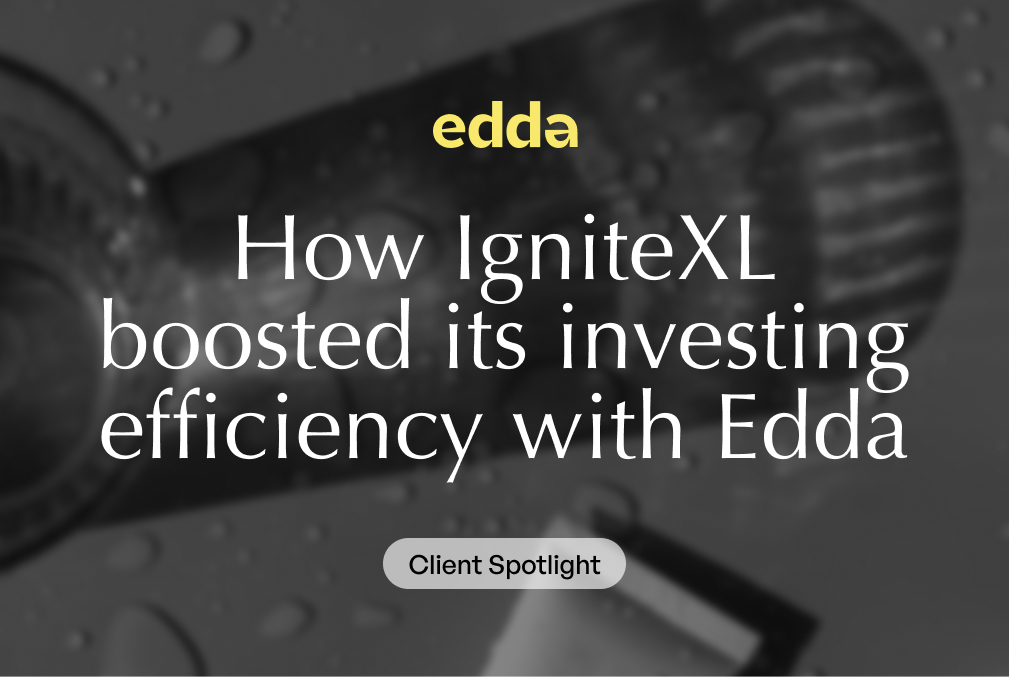Private equity dealflow refers to the rate at which business proposals, including investment opportunities, are presented to investment firms. It can be thought of as the heartbeat of private equity, as it reflects the general health and vitality of the sector.
In the competitive world of private equity, the dynamics of deal sourcing are constantly evolving. This environment demands innovative solutions to keep firms ahead of the curve. Identifying and capitalizing on opportunities requires more than just a keen eye for potential investments. The nature of private equity deal sourcing has become increasingly relationship-driven, with a strong emphasis on building and nurturing connections that can open doors to high-value deals.
In this article, we explore the emphasis on relationship building in deal sourcing, delving into the critical role that technology and data play in streamlining and enhancing this process. In addition, find out how Edda’s dealflow management software can be a major asset.
Relationships as the Bedrock of Effective Deal Sourcing
In private equity, the significance of relationship building cannot be overstated. It’s not just about crunching numbers and conducting due diligence; it’s about cultivating relationships, forging trust, and understanding that warm connections often pave the way to the most strategic and profitable deals.
Furthermore, it’s important to constantly assess the firm’s existing network, as it may harbor untapped prospects. A report by PWC corroborates this, revealing that 89% of CEOs believe their existing networks are indispensable to the growth of their businesses.
Nurturing significant relationships—through regular, meaningful interactions—is key to keeping the dealflow pipeline healthy. This consistent engagement cultivates a sense of trust and loyalty that can unlock further opportunities down the line.
Enhancing Private Equity Dealflow: Best Practices
Let’s delve into four vital strategies to augment PE dealflow in today’s swiftly evolving market environment:
Refine Your Investment Principles and Methodology
The foremost action in elevating the quality of your deal flow hinges on ensuring that your team maintains a unified understanding of your investment strategy.
What are the bedrock elements of your fund’s investment ideology? What categories of deals spark enthusiasm within your firm for investment?
Reflect on the stage of the business (startup or mature), the geographical scope, the industry, or cash flow. In addition, examine the unique expertise your firm and LPs provide, and identify the types of companies you could most effectively assist in value creation.
When it comes to boundaries, what are the parameters within which you operate? Are there any particular sectors or segments that your firm deliberately bypasses?
Explore Your Existing Network for Untapped Potential
Exploring the untapped potential in your existing network is a valuable approach often overlooked when seeking new opportunities. Your pre-established relationships might offer a rich mine of prospects and dealflow.
Reevaluate past referrals and opportunities from your current portfolio companies. Previously declined proposals may now present a valuable opportunity aligning with your firm’s strategy. To keep track of these records effectively, top private equity firms use intelligent CRM platforms, which record activities in real time and facilitate future recall and review.
Further, initiate a review of your current network for new referrals. Identify relationships that could connect you to new, advantageous deals. Possible sources of these referrals can range from service providers, such as lawyers, insurance brokers, accountants, and consultants, to other investors at private equity funds, venture capital firms, and investment banks. Domain experts and transaction intermediaries, including M&A advisors, investment bankers, and business brokers, can also offer valuable connections.
Using a unified data repository for these relationships can enable you to understand more clearly who knows who. A CRM equipped with relationship intelligence can take this a step further by providing relationship-scoring technology. This evaluates not only the existence of a connection but also the strength of the relationship, further enhancing your strategic networking capabilities. This consolidated and comprehensive approach can lead to more efficient and effective network utilization and, ultimately, higher-quality deal flow.
Cultivate Your Critical Relationships
Cultivating and nurturing strong relationships goes beyond superficial interactions. Rather than rushing into strategic, deal-focused discussions, it’s crucial to foster genuine connections that are grounded in respect, trust, and open communication.
An effective approach to fostering relationships includes actively connecting people within your network who might benefit from knowing each other. Sharing engaging content, such as news articles and recent research, can provide value while promoting their content within your network can help them broaden their reach and demonstrate your personal appreciation of their work.
Personal engagement is also important, extending beyond professional topics to include inquiries about their family, hobbies, or responses to events affecting their lives. If you’re attending a nearby event, consider inviting them for a meal or, if appropriate, offering them a ticket to join you at the event.
Make relationship building and maintenance a regular part of your routine, dedicating time each week to meaningfully connect with several contacts. Utilize tools with reminder systems to ensure no one falls off your radar. Respect and active listening are crucial in these interactions, as they foster understanding and trust, which are fundamental in strong relationships.
Implement Technology and Automation for Deal Management
While many private equity firms adhere to traditional deal-making procedures, progressive ones are embracing the changing market through cutting-edge investment strategies and technologies.
One crucial approach is automated data capture, significantly reducing time spent on laborious data entry and freeing up resources for relationship building, enhancing deal flow. The diversity of data managed by PE firms, such as contact details, meeting notes, phone records, email correspondences, company updates, and industry notes, can be overwhelming. By leveraging automation, these firms save time that can be refocused towards productive activities like networking and fostering relationships.
A unified data source is essential to avoid communication gaps and loss of critical information that could result in missed investment opportunities. The solution is a relationship intelligence CRM, which centralizes deal and relationship data in an intuitive system, thereby enabling smooth management of deal flow and informed decision-making.
The focus for modern firms lies in two key areas: automating data capture and establishing a single, reliable source of truth. Automated data capture liberates teams from manual labor, with relationship intelligence CRMs standing out for their ability to automatically populate data from various sources like emails, calendar events, and external data partners. A centralized data repository streamlines deal flow processes by consolidating data in a user-friendly system, enhancing your firm’s ability to operate swiftly and confidently.
Data hygiene is crucial for the effectiveness of the dealflow CRM, impacting targeting precision and overall functioning. Automated CRM solutions guarantee clean data, leading to better insights, quicker decision-making, and reliable analytics.
Finally, the CRM system should offer connections to various data sources, facilitating data unification, analysis, and activation to create personalized experiences. The ability to integrate multiple data sources, including data lakes and analytics platforms, makes it a powerful tool for managing customer relationships. With the adoption of such advanced technologies and strategies, firms can stay competitive and responsive to rapid market changes.
The Power of Edda in Enhancing Private Equity Dealflow
Automating the process of data capture and management is crucial. Here, Edda emerges as a pivotal tool in the private equity toolkit. This cutting-edge platform eliminates the manual burdens of deal sourcing and relationship management by automating the data capture process, delivering real-time insights and centralizing all information within a unified platform.
This centralization offers several advantages. For one, it enhances visibility, enabling firms to keep their fingers on the pulse of their deal flow and relationship metrics. Additionally, it accelerates the decision-making process and removes the obstacle of data silos, enabling firms to better manage their relationships and source deals more effectively.
Another key advantage of Edda’s private equity and venture capital management software is its superior business intelligence capabilities. Edda’s platform can provide valuable insights into market trends and investment opportunities, thereby empowering firms to stay one step ahead of the competition. This ability to make data-driven decisions helps firms optimize their operations, maximize their returns, and maintain a strong, robust deal flow pipeline.
Achieving optimization in private equity involves a delicate balance. While relationship-building is critical, leveraging technology—such as Edda—can make this process more streamlined and efficient. By automating routine tasks, Edda’s deal flow management software allows teams to focus their efforts on strategic initiatives and personal interactions, which can have a significant impact on deal sourcing.









